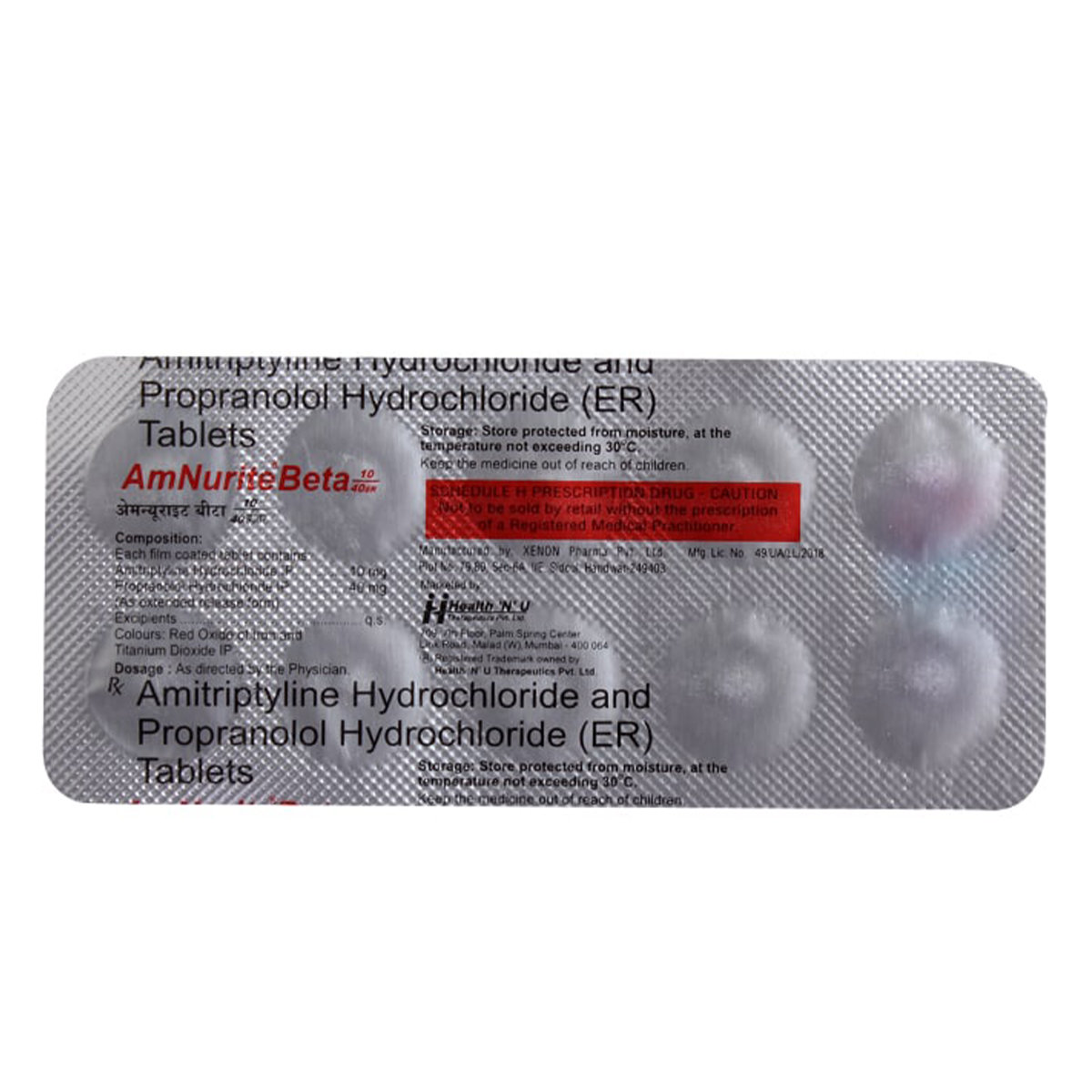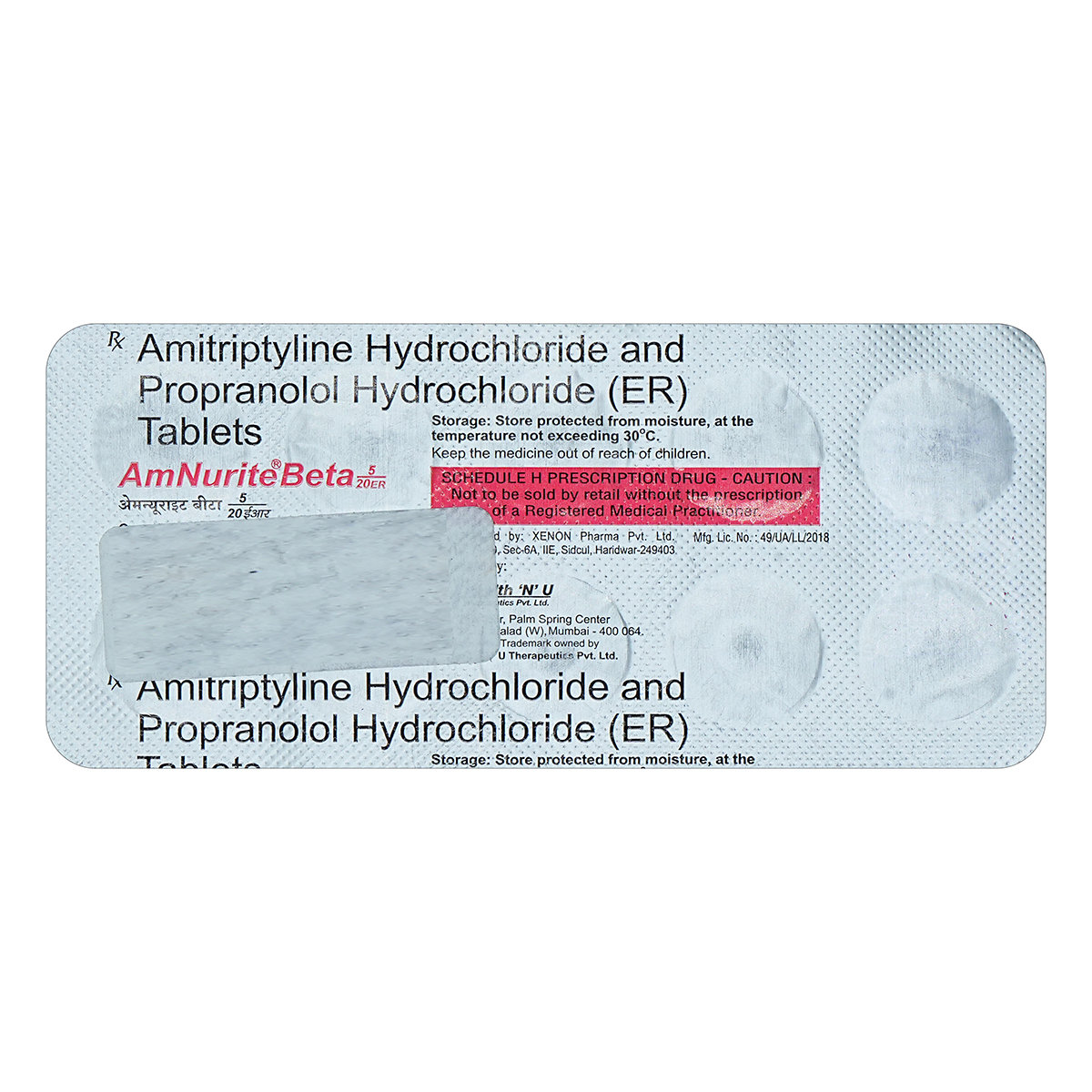Amitriptyline+propranolol
About Amitriptyline+propranolol
Amitriptyline+propranolol belongs to a group of medicines called tricyclic anti-depressants used to prevent migraine attacks with co-morbid conditions like insomnia, neuralgia pain, hypertension, and anxiety. A migraine is usually a moderate or severe headache felt as a throbbing pain on one side of the head.
Amitriptyline+propranolol is a combination of two medicines, namely, amitriptyline and propranolol. Amitriptyline inhibits the membrane pump mechanism responsible for the serotonin uptake in serotonergic neurons, increasing serotonin levels and decreasing electrical activity in the brain. Amitriptyline can also change how your nerves receive pain signals so the pain goes away. Propranolol is a beta-blocker. It also widens the blood vessels in the body for better blood flow. Thereby, it helps to relieve your symptoms of pain or migraine.
You are advised to take Amitriptyline+propranolol for as long as your doctor has prescribed it for you, depending on your medical condition and response to the treatment. In some cases, you may experience common side effects such as weight gain, dry mouth, blurred vision, increased intraocular pressure, constipation, sedation and drowsiness, hypotension, syncope, tachycardia, palpitations, myocardial infarction, and arrhythmias. Most of these side effects do not require medical attention and will resolve gradually over time. However, you are advised to talk to your doctor if you experience these side effects persistently.
To treat your condition effectually, continue using Amitriptyline+propranolol for as long as your doctor has prescribed it. Do not use Amitriptyline+propranolol without a doctor's advice if you had a skin reaction or irritation to any medicine. Consult your doctor before using Amitriptyline+propranolol if you are pregnant or breastfeeding. Do not use Amitriptyline+propranolol in more than prescribed doses or longer duration as it may cause adverse effects. Keep your doctor informed about your health condition and all the medicines you take before taking Amitriptyline+propranolol to rule out any side effects.
Uses of Amitriptyline+propranolol
Medicinal Benefits
Amitriptyline+propranolol prevents migraine attacks with co-morbid conditions like insomnia, neuralgic pain, hypertension, and anxiety. It contains amitriptyline and propranolol. Amitriptyline inhibits the membrane pump mechanism responsible for the serotonin uptake in serotonergic neurons, increasing serotonin levels and decreasing electrical activity in the brain. Amitriptyline can also change how your nerves receive pain signals so the pain goes away. Propranolol is a beta-blocker. It also widens the blood vessels in the body for better blood flow. Thereby, it helps to relieve your symptoms of pain or migraine.
Directions for Use
- Amitriptyline+propranolol can be taken with or without food as advised by your doctor.
- Follow your doctor’s instructions on the dosage and timing of this medication.
- Swallow Amitriptyline+propranolol as a whole with a glass of water.
- Do not crush, break, or chew it.
Storage
Side Effects of Amitriptyline+propranolol
- Weight gain
- Dry mouth
- Blurred vision
- Increased intraocular pressure
- Constipation
- Drowsiness
- Hypotension
Drug Warnings
To treat your condition effectually, continue taking Amitriptyline+propranolol for as long as your doctor has prescribed. Do not take Amitriptyline+propranolol if you are pregnant or breastfeeding unless prescribed by the doctor. Amitriptyline+propranolol causes drowsiness, sleepiness and dizziness, do not drive unless you are alert. Avoid consuming alcohol along with Amitriptyline+propranolol as it could lead to increased drowsiness and dizziness. Keep your doctor informed about your health condition and medicines to rule out any side effects. Amitriptyline+propranolol can cause extra side effects if you stop taking it suddenly. Talk to your doctor if you want to stop taking it. Amitriptyline in Amitriptyline+propranolol may cause decreased sex drive and problems with erections and orgasm. Also, Amitriptyline can change appetite.
Drug Interactions
Drug-Drug Interactions: Amitriptyline+propranolol may interact with a medication used to help people with alcoholism avoid drinking (e.g. disulfiram), blood thinner medication (e.g. warfarin), a heartburn/ulcer medication (e.g. cimetidine), medicines used to treat high blood pressure (e.g. clonidine, labetalol), a drug used to treat HIV infection (e.g. delavirdine), a diarrhoea medication (e.g. diphenoxylate), medicines used in chemotherapy (e.g. imatinib and procarbazine), hormonal medicines (e.g. levothyroxine), a medicine used to treat anxiety disorders and panic disorder (e.g. alprazolam), medications used to treat certain types of seizures (e.g. pregabalin), skeletal muscle relaxant medications (e.g. cyclobenzaprine), a medicine used to treat epilepsy (e.g. topiramate) and medicines used to treat depression (e.g. duloxetine, escitalopram, topiramate).
Drug-Food Interactions: Avoid consuming alcohol along with Amitriptyline+propranolol as it may increase the sedative effects.
Drug-Disease Interactions: Amitriptyline+propranolol may interact with disease conditions, including anticholinergic effects, cardiovascular disease, pheochromocytoma, acute myocardial infarction recovery, cardiovascular disease, depression, seizure disorders, bradyarrhythmia/AV block, cardiogenic shock/hypotension, CHF (Congestive Heart Failure), diabetes, hypersensitivity, ischemic heart disease, PVD (Peripheral Arterial Disease), asthma and liver disease.
Drug-Drug Interactions Checker List:
Safety Advice

Alcohol
cautionAvoid consuming alcohol when taking the Amitriptyline+propranolol as it may cause excessive drowsiness.

Pregnancy
cautionThere is limited data on how Amitriptyline+propranolol affects pregnancy. Please consult your doctor if you are planning to become pregnant or are already pregnant before starting Amitriptyline+propranolol.

Breast Feeding
cautionConsult your doctor; there is no substantial research yet on using Amitriptyline+propranolol in breastfeeding/nursing mothers.

Driving
cautionAmitriptyline+propranolol causes blurred vision and hypotension. Do not drive or operate machinery unless you are alert.

Liver
cautionAmitriptyline+propranolol to be taken with caution, especially if you have a history of Liver diseases/conditions. Please consult the doctor; your doctor will weigh the benefits and potential risks before prescribing Amitriptyline+propranolol.

Kidney
cautionAmitriptyline+propranolol to be taken with caution, especially if you have a history of Kidney diseases/conditions. Please consult the doctor; your doctor will weigh the benefits and potential risks before prescribing Amitriptyline+propranolol.

Children
unsafeThe safety and efficacy of Amitriptyline+propranolol in children have not been established.
Habit Forming
Diet & Lifestyle Advise
- Maintaining a healthy diet and exercising regularly helps improve overall health and boosts self-esteem.
- Regularly attend therapy sessions.
- Perform meditation and yoga. This helps in relieving stress and provides relaxation.
- Follow a regular sleep pattern to improve the amount and quality of sleep you get.
- Include foods rich in omega fatty acids such as fish, nuts, fresh fruits, vegetables and olive oils.
- Neurotransmitters are made up of amino acids. Amino acid-rich foods such as meat, dairy products, and certain fruits and vegetables help maintain neurotransmitters.
- Complex carbohydrates help in stimulating serotonin (a feel-good neurotransmitter). These include whole grains, legumes, spinach, broccoli, oranges and pears.
- Exercising helps in the production of the body’s natural antidepressants. It also helps relieve stress, improve mood, boost self-esteem, and provide restful sleep.
- Avoid smoking and alcohol consumption.
- Learn about your condition, understand the risk factors and follow the doctor’s treatment plan.
Patients Concern
Disease/Condition Glossary
Migraine: A migraine is a headache that is usually moderate or severe, with throbbing pain on one side of the brain. Migraine is a frequent health problem that affects one out of every five women and one out of every fifteen males. They usually start while a person is in their early twenties. Many people also experience symptoms like nausea, vomiting, and increased sensitivity to light and sound.
Insomnia: It is a condition in which you have difficulty sleeping on a regular basis. It normally improves with a change in sleeping patterns. Short-term insomnia is defined as insomnia that lasts for less than three months. Long-term insomnia is defined as insomnia that lasts three months or more. Stress, anxiety, or sadness, noise, alcohol, coffee, or nicotine, uncomfortable beds, a room that is too hot or chilly, and using recreational drugs such as cocaine or ecstasy are all typical causes of insomnia.
Neuralgic Pain: It is defined as pain caused by injured or inflamed nerves. Shingles, trigeminal neuralgia, and diabetes are all conditions linked to Neuralgic Pain or Neuralgia. Numbness, tingling, or other unpleasant sensations along the nerve's route are sometimes experienced in addition to pain.
FAQs
Amitriptyline+propranolol belongs to a group of medicines called tricyclic anti-depressants used to prevent migraine attacks with co-morbid conditions like insomnia, neuralgia pain, hypertension, and anxiety.
Amitriptyline+propranolol contains amitriptyline and propranolol. Amitriptyline inhibits the membrane pump mechanism responsible for the serotonin uptake in serotonergic neurons, increasing serotonin levels and decreasing electrical activity in the brain. Amitriptyline can also change the way that your nerves receive pain signals so the pain goes away. Propranolol is a beta-blocker. It also widens the blood vessels in the body for better blood flow. Thereby, it helps to relieve your symptoms of pain or migraine.
No, it is a prescribed drug given by a physician to prevent specific medical conditions. Taking it on your own can cause unwanted side effects.
Amitriptyline in Amitriptyline+propranolol may cause decreased sex drive and problems with erection and orgasm. Consult your doctor if you have any concerns regarding this.
Amitriptyline+propranolol may cause dry mouth as an adverse effect. Limiting caffeine intake, avoiding smoking and alcohol-containing mouthwashes, drinking plenty of water, and eating sugar-free gum/candy may help promote saliva and prevent mouth drying.
There is no indication that Amitriptyline+propranolol impacts male or female fertility. Consult your doctor if you are trying to conceive or have difficulty conceiving while taking Amitriptyline+propranolol.





